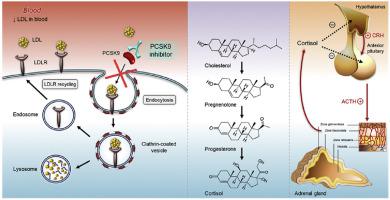Atherosclerosis ( IF 4.9 ) Pub Date : 2021-03-31 , DOI: 10.1016/j.atherosclerosis.2021.03.028 Simon Meier 1 , Marcel Frick 1 , Michael Liu 1 , Seyed Soheil Saeedi Saravi 2 , Giulia Montrasio 1 , Helga Preiss 1 , Lisa Pasterk 3 , Nicole Bonetti 3 , Michael Egloff 1 , Hans-Rudolf Schmid 1 , Isabella Sudano 4 , Giovanni G Camici 3 , François Mach 5 , Thomas F Luescher 6 , Georg Ehret 5 , Jürg H Beer 2

|
Background and aims
Treatment with proprotein convertase subtilisin-kexin type 9 inhibitors (PCSK9i), in addition to statin therapy, reduces LDL-cholesterol (LDL-c) in some patients to extremely low levels (i.e.< 20 mg/dl or < 0.52 mmol/l). There is concern that at such low levels, the physiologic role of cholesterol may be impaired, e.g. the adrenal cortisol stress response might be compromised. We therefore evaluated the effect of PCSK9i therapy on the cortisol response to ACTH in patients with LDL-c down to extremely low levels.
Methods
Nineteen patients on PCSK9i therapy and 18 controls matched for age, gender and comorbidities were included. The cortisol response to adrenocorticotropic hormone (ACTH) was tested after application of 250 μg ACTH.
Results
LDL-c levels ranged from 0.42 to 3.32 mmol/l (mean 1.38 ± 0.84 mmol/l) in the PCSK9i group and 0.81–4.82 mmol/l (mean 2.10 ± 0.97) in the control group. By analysis of covariance (ANCOVA), the PCSK9i group had significantly lower cortisol response compared to the control group (- 97.26 nmol/l, −178.60 to −15.93, p = 0.02) after 60 min. There was a significant positive correlation between the duration of PCSK9i treatment and cortisol levels (r = 0.59, p = 0.009). Extremely low LDL-c levels down to 0.42 mmol/l were not associated with lower stimulated cortisol levels.
Conclusions
Patients on PCSK9i therapy showed a significantly lower cortisol response to ACTH. Stimulated cortisol levels were lower in the first months of PCSK9i treatment, suggesting an adaptive phenomenon. We conclude that the adrenal stress response in patients on PCSK9 inhibitor therapy is reduced.
中文翻译:

降低PCSK9抑制剂治疗患者的肾上腺应激反应
背景和目标
除他汀类药物治疗外,还使用前蛋白转化酶枯草杆菌蛋白酶-kexin 9型抑制剂(PCSK9i)治疗将某些患者的LDL-胆固醇(LDL-c)降低至极低的水平(即<20 mg / dl或<0.52 mmol / l) 。令人担忧的是,在如此低的水平下,胆固醇的生理作用可能会受到损害,例如,肾上腺皮质醇应激反应可能会受到损害。因此,我们评估了PCSK9i治疗对低至极低水平的LDL-c患者皮质醇对ACTH反应的影响。
方法
包括19例接受PCSK9i治疗的患者和18例年龄,性别和合并症相匹配的对照。应用250μgACTH后测试皮质醇对促肾上腺皮质激素(ACTH)的反应。
结果
PCSK9i组的LDL-c水平范围为0.42至3.32 mmol / l(平均1.38±0.84 mmol / l),对照组的LDL-c水平范围为0.81–4.82 mmol / l(平均2.10±0.97)。通过协方差分析(ANCOVA),与对照组相比,PCSK9i组 在60分钟后的皮质醇反应显着降低(-97.26 nmol / l,-178.60至-15.93,p = 0.02)。PCSK9i治疗的持续时间与皮质醇水平之间存在显着的正相关(r = 0.59,p = 0.009)。低至0.42 mmol / l的极低LDL-c水平与较低的刺激皮质醇水平无关。
结论
接受PCSK9i治疗的患者显示皮质醇对ACTH的反应明显降低。在PCSK9i治疗的最初几个月中,刺激的皮质醇水平较低,表明存在适应性现象。我们得出结论,接受PCSK9抑制剂治疗的患者的肾上腺应激反应降低。






























 京公网安备 11010802027423号
京公网安备 11010802027423号